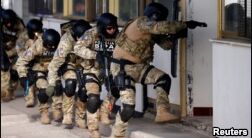正文
即使IS力量减弱 欧洲专家仍预计会发生恐怖袭击
Terrorism experts say the collapse of the Islamic State terrorist group in Syria and Iraq may not reduce its efforts to spread in Europe.
European officials remain concerned that the group will continue to gain and radicalize European followers. They also say it may not reduce so-called "lone wolf" attacks in Europe.
Kurdish-led forces supported by the United States are close to removing Islamic State forces from the Syrian city of Raqqa. The terror group has used the city as its headquarters in Syria. But French and Belgian officials do not believe killings will stop in Europe for the next few years.
Experts say territory held by the Islamic State helped the group gain fighters from other countries. They say it also helped the group show it was different from the terror group al-Qaida which opposed the creation of the Islamic State, or IS.

Al-Qaida’s leaders criticized Islamic State leader Abu Bakr al-Baghdadi for naming himself caliph, or leader. Experts say one way for IS to show it still has power is to carry out attacks on targets in the West like al-Qaida did.
Last month, al-Baghdadi released a recording in which he criticized the United States. It was the first time he had spoken publicly in 11 months.
In the recording, he called on jihadists to attack the Syrian government. And he said IS still exists although it has lost much of the territory it had captured. He repeated the words of IS propaganda chief Abu Mohammad al-Adnani. He said holding territory was less important than the desire to fight. Al-Adnani is now dead.
Al-Baghdadi also praised attacks on the West. He said “America, Europe and Russia are living in a state of terror."
French president says terrorism a top priority
French President Emmanuel Macron spoke about terrorism in August. At the time, IS had been ousted from the Iraqi city of Mosul and Kurdish-led forces began their attack on Raqqa.
Macron said the fight against Islamic terrorism is France’s “top priority.” He said it would remain so for some time.
Since 2015, a series of terror attacks has killed more than 240 people in France. The country has 350 Islamic extremists in prison and nearly 6,000 militants under surveillance.
Belgium also has supplied an unusually large number of fighters to IS and other jihadist groups.
French and Belgian officials say IS is very innovative. They say efforts to reduce the group’s activities on the internet have not been very successful. The group makes changes to its messages often to target possible recruits.
It tests new ideas, much like companies that sell products do.
Charlie Winter recently published a study on IS for the International Center for the study of Radicalization and Political Violence. The research center is based in King’s College, London.
Winter says the media war has always been as important for IS as victories in Syria and Iraq. He wrote that, for IS, “propaganda production and dissemination is at times considered to be even more important than military jihad.”
Winter says that although IS has lost much of its territory, it can still take part in information warfare and recruit and incite. And he says “the international community must be equally as creative and strategic-minded in its approach towards counter-communications.”
Officials and experts warn that radicalization remains a serious problem. Former French Prime Minister Manuel Valls has called radicalization “a deadly social model.”
France is not alone in struggling to understand radicalization and to develop effective ways to fight it. Western governments still do not know how people are radicalized and why they take part in deadly attacks.
Farhad Khosrokhavar is a sociologist and professor in Paris, France. He is concerned that governments still consider radicalization only a national security problem.
He says governments should understand radicalization as part of other long-term problems. These include problems of stigmatization, social exclusion and delinquency.
He says experts are only beginning to understand how the internet and closed social media groups can help form jihadist groups.
He said they can be used to create the cult of what he calls the “negative hero.”
At a conference in London last year, Khosrokhavar said a number of jihadist attackers in the West had been diagnosed with depression or other mental illnesses.
But political leaders facing public demands to stop violence often resist efforts to increase understanding of radicalization.
Former French Prime Minster Valls once said he was tired of social and cultural excuses used to explain jihad.
“To explain is to excuse,” he said.
Both France and Belgium have struggled to create programs that reduce radicalization. Earlier this year, an effort to create de-radicalization centers in France ended because of differences over how to run the programs.
I’m Bryan Lynn.
And I'm Anne Ball.
Correspondent Jamie Dettmer reported this story from Brussels, Belgium. Christopher Jones-Cruise adapted the report for VOA Learning English. Mario Ritter was the editor.
We want to hear from you. Write to us in the Comments Section, or visit our www.hxen.net .
- 上一篇

- 下一篇

相关文章
- US, Haiti Seek Release of 17 Missionaries Taken by Gang
- Chinese Parents Praise Rule Limiting Video Game Time
- Former Diplomat Likely to Become Japan’s Next Prime Minister
- Creators of Molecule Building Tool Win Nobel Prize in Chemistry
- This Ain't It和其他简短的形式
- “正念”专家帮助展示教孩子减压
- 专家:疫情期间报道可信新闻的重要性
- 拉尼娜天气预计将持续到2021年
- In Puerto Rico, Creative Directions Make Up for Missing Addresses
- 专家在墨西哥古城学习写作


 手机网站
手机网站